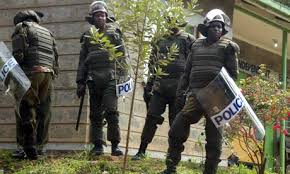Kenya police and military accused of victimising Muslims over terror attacks

 Kenyan security forces were slow to respond to attacks on villages along the country’s coast last year and afterwards arbitrarily detained and beat Muslims and ethnic Somalis as well as stealing personal property, claims a report by rights groups.
Kenyan security forces were slow to respond to attacks on villages along the country’s coast last year and afterwards arbitrarily detained and beat Muslims and ethnic Somalis as well as stealing personal property, claims a report by rights groups.
Human Rights Watch (HRW) and the Kenya Human Rights Commission urged the government to increase its oversight of police and military investigations, noting that a year after the deadly coastal attacks, for which the Islamist group al-Shabaab claimed responsibility, no one has been held accountable.
Kenya is facing its most serious security crisis in decades as al-Shabaab wages a campaign of terror along its border with Somalia, with sporadic attacks elsewhere. In April, the terror group laid siege to Garissa University campus, killing 148 people.
In the report, Insult to Injury: The 2014 Lamu and Tana River Attacks and Kenya’s Abusive Response, the rights groups documented assaults on the coastal town of Mpeketoni, near the tourist island of Lamu, and on several other villages in the Lamu and Tana River counties in June and July 2014. At least 87 people were killed in the attacks.
The deadliest assault happened in Mpeketoni, where armed men drove into town, threw explosives into the police station and shot civilians at random, killing at least 48 people.
In interviews in eight villages in the area in October, the rights groups recorded not only witness accounts of the attacks but also allegations of abuse by security forces.
The report, published on Monday, said hundreds of people had been beaten and detained without charge while communities remained vulnerable to further attacks. It criticised security services for failing to respond and for detaining terror suspects on flimsy charges for longer than 24 hours, the maximum amount of time suspects can be held without charge under Kenyan law.
“I think they only stopped beating us because they were tired,” one 42-year-old man, who was detained by Kenyan police last year, told researchers.
Leslie Lefkow, the deputy Africa director of HRW, said: “There’s a pattern here of the authorities scapegoating the wrong targets in their response to terrorist attacks. Whether that’s beating up and rounding up community members because of their ethnicity or their religion, or what we’ve seen with the way that they’ve gone after some of the NGOs on the coast, who have been working on these issues and documenting human rights violations.”
Thinktanks have warned that the Kenyan government’s targeting of Muslims could drive radicalisation in the country.
“A response that ignores basic rights is not effective, and only risks making the situation worse,” said Davis Malombe, deputy director of the Kenya Human Rights Commission.
Part of the problem is poor coordination between different government ministries and inadequate police work, HRW said. “The lack of police investigation – questioning of witnesses, taking of statements, collecting of evidence – is a pattern that we’ve observed in a number of different places and at different times,” Lefkow said.
“No one here has recorded a statement with police because the police have not asked for statements. We don’t know how they are carrying out investigations if they cannot talk to those who saw the attackers or the survivors,” an employee of the Kenya Red Cross told researchers.
Kenya’s inspector general of police, the chief of general staff and the director general of the Kenya Wildlife Service did not respond to requests for comment, the rights groups said.
With more power being ceded to security services, including expanded rights to use firearms and detain suspects, the government must improve its oversight of police in order to fend off terrorists and protect civilians, the study said.
“Kenyan authorities have not conducted any known investigations into human rights abuses by its counterterrorism forces, despite credible allegations of abuse,” it said.
While efforts by Kenya’s Independent Policing Oversight Authority (IPOA) to hold police to account were applauded by the report’s authors, they called for further action. “There is an urgent need for political will to undertake the kind of reforms that will improve the security response and make Kenya safer,” Lefkow said.
The report said the IPOA should “ensure all those implicated in human rights abuses are removed from their positions and held to account”.
Last week, the Kenyan government announced a £180m rise in funding for counterterrorism operations in its latest budget (pdf).
Kenya’s security services also receive funding from the US, the UK and other international donors, who have not spoken out publicly against recent reports of rights abuses. “I’m sure there is discussion privately on some of these concerns, but the question is whether the oversight and pressure for reforms is really at the level it needs to be,” Lefkow said.
The country’s tourism sector, one of the pillars of the economy, is paying the price of deepening insecurity as governments warn their citizens to stay away from popular coastal resorts like Lamu, Mombasa and Malindi.
Kenya said the threat of terrorist attacks could damage its development agenda, which aims to transform the republic into a middle-income country by 2030. “Without security for our citizens, achieving our growth and development objectives will remain a mirage,” Kenya’s finance minister, Henry Rotich, said on 11 June in an address to the country’s parliament
guardian.com